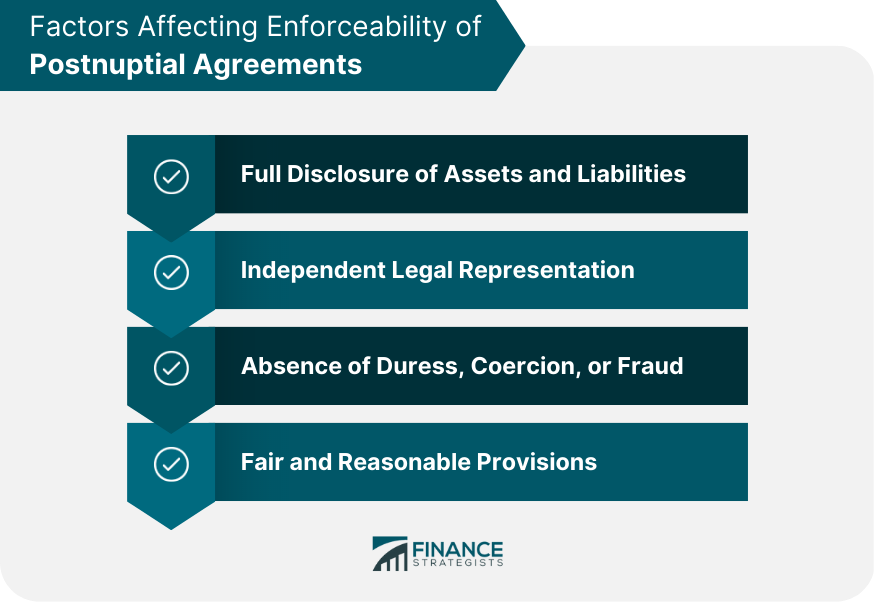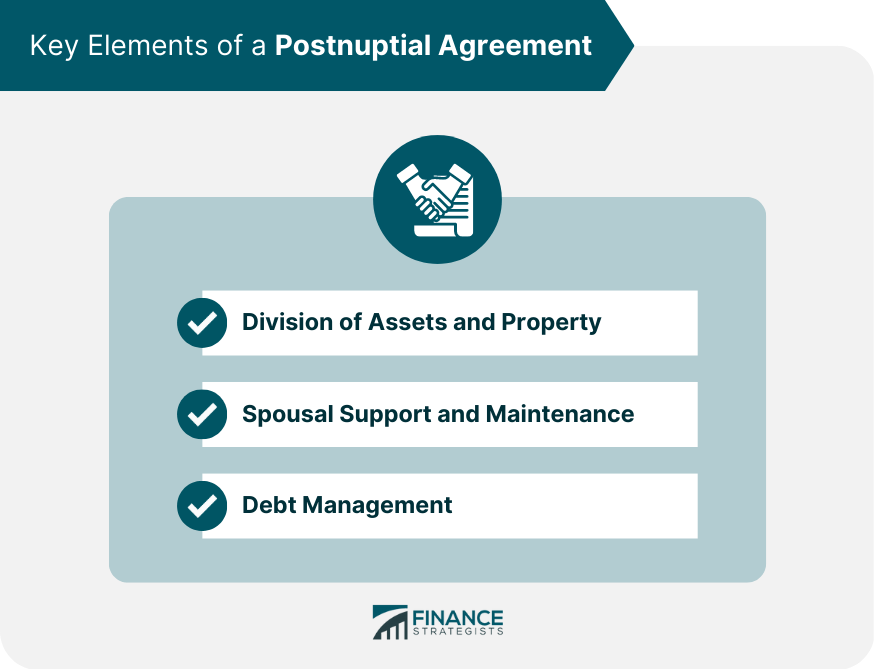What Are Postnuptial Agreements?
Postnuptial agreements are legally binding contracts voluntarily entered into by married couples that outline the division of assets, property, and debts in the event of a divorce or separation. They are created after the couple has already married and serve to protect each spouse's financial interests.
Postnuptial agreements provide a clear understanding of financial rights and responsibilities within a marriage, helping to avoid disputes in case of a divorce or separation. They offer a sense of security and promote open communication about financial matters between spouses.
While postnuptial agreements are created after a couple is married, prenuptial agreements are established before the marriage takes place. Both agreements serve similar purposes in protecting individual assets and outlining financial responsibilities in case of a divorce or separation.
Legal Considerations for Postnuptial Agreements
Validity and Enforceability
The enforceability of postnuptial agreements varies by state, as each jurisdiction has its own laws and regulations. To be considered valid, most states require a written agreement, full disclosure of assets and liabilities, independent legal representation for both parties, and fair provisions.
Factors Affecting Enforceability of Postnuptial Agreements
Postnuptial agreements may be challenged in court if they do not meet certain conditions, including:
Full disclosure of assets and liabilities: Both parties must provide an accurate and complete account of their finances.
Independent legal representation: Each spouse should have their own attorney to ensure their interests are protected.
Absence of duress, coercion, or fraud: The agreement must be entered into voluntarily and without pressure or deception.
Fair and reasonable provisions: The terms of the agreement should not be excessively unfair to one party.

Reasons for Considering a Postnuptial Agreement
Changes in Financial Circumstances
Postnuptial agreements can be beneficial in cases where financial circumstances change, such as:
Inheritance or windfall: A spouse receives a significant amount of money or property.
Business ownership or growth: A spouse starts or expands a business, which may impact the couple's finances.
Debt management: A spouse incurs substantial debt, which could affect the other spouse's financial security.
Changes in Personal Circumstances
Personal changes may also prompt the need for a postnuptial agreement, including:
Infidelity or breach of trust: A spouse has been unfaithful or dishonest, leading to a desire to protect assets.
Changes in career or education: A spouse decides to pursue a new career or return to school, impacting the couple's financial situation.
Health issues or disability: A spouse experiences a significant health issue or becomes disabled, requiring adjustments to the couple's financial plans.
Family and Estate Planning
Postnuptial agreements can also play a crucial role in family and estate planning, such as:
Protection of children from previous relationships: Ensuring that children from previous relationships receive their fair share of assets or inheritance.
Clarification of inheritance rights: Defining how assets and property will be distributed upon a spouse's death.
Allocation of assets and property: Outlining how assets and property will be divided in the event of a divorce or separation.
Key Elements of a Postnuptial Agreement
Division of Assets and Property
The postnuptial agreement should address the division of assets and property, including:
Separate vs. marital property: Clearly defining which assets are considered separate or marital property.
Appreciation of separate property: Addressing how the appreciation of separate property will be treated in case of a divorce or separation
Division of business interests: Establishing how business assets will be divided and whether a spouse will retain an interest in the other spouse's business.
Spousal Support and Maintenance
Spousal support, also known as alimony, should be outlined in the postnuptial agreement, including:
Duration and amount: Specifying the length of time and amount of spousal support to be paid.
Modification or termination: Establishing the conditions under which spousal support can be modified or terminated.
Factors affecting support: Identifying factors that may impact the determination of spousal support, such as income, earning capacity, and the standard of living during the marriage.
Debt Management
Addressing the allocation and management of debts is essential in a postnuptial agreement:
Allocation of responsibility: Determining which spouse is responsible for specific debts, including those incurred before and during the marriage.
Protection from spouse's debts: Ensuring that one spouse is not held responsible for the other's separate debts.
Future debt considerations: Outlining how future debts will be managed and divided between the spouses.

Challenges and Pitfalls of Postnuptial Agreements
Emotional and Relationship Considerations
Entering into a postnuptial agreement can have emotional and relational consequences, such as:
Trust and communication: The process of negotiating a postnuptial agreement can test the couple's trust and communication skills.
Perceptions of fairness: Ensuring that both parties perceive the agreement as fair and reasonable is critical for the success of the agreement and the relationship.
Legal Challenges
Postnuptial agreements can also face legal challenges, including:
Enforceability issues: If the agreement does not meet the required conditions, it may be deemed unenforceable in court.
Future modifications or amendments: Changes in circumstances may require modifications to the postnuptial agreement, which can be a complex legal process.
Impact on divorce proceedings: The existence of a postnuptial agreement may influence the course of divorce proceedings, potentially adding to the complexity and duration of the process.
Conclusion
Fostering open communication and transparency between spouses is essential when considering postnuptial agreements.
Both parties must be willing to discuss their financial situations and expectations honestly, which can help build trust and understanding in the relationship.
Although discussing financial matters can be challenging, the process can ultimately strengthen the marital bond by clarifying each spouse's rights and responsibilities.
Legal professionals play a vital role in drafting and reviewing postnuptial agreements, ensuring their validity, fairness, and enforceability.
By striking a balance between protecting individual interests and nurturing a healthy marriage, postnuptial agreements can provide couples with a sense of security and a solid foundation for their future together.
Couples who approach this process with a spirit of cooperation and mutual respect can find that postnuptial agreements are valuable tools for navigating financial challenges and ensuring marital harmony.
Postnuptial Agreements FAQs
A postnuptial agreement is a legal agreement between two spouses made after their marriage that outlines how their assets and debts will be divided in the event of a divorce or separation.
Couples may consider a postnuptial agreement for a variety of reasons, such as changing financial circumstances, a desire to protect separate assets, or to clarify financial expectations in the marriage.
Yes, a postnuptial agreement is generally enforceable in court as long as it meets certain legal requirements, such as being in writing, signed by both spouses, and not obtained through fraud or duress.
Yes, a postnuptial agreement can be modified or revoked if both spouses agree to the changes and they are made in writing and signed by both parties.
It is highly recommended to have an attorney involved in the creation of a postnuptial agreement to ensure that it is legally binding and protects both parties' interests.
True Tamplin is a published author, public speaker, CEO of UpDigital, and founder of Finance Strategists.
True is a Certified Educator in Personal Finance (CEPF®), author of The Handy Financial Ratios Guide, a member of the Society for Advancing Business Editing and Writing, contributes to his financial education site, Finance Strategists, and has spoken to various financial communities such as the CFA Institute, as well as university students like his Alma mater, Biola University, where he received a bachelor of science in business and data analytics.
To learn more about True, visit his personal website or view his author profiles on Amazon, Nasdaq and Forbes.











